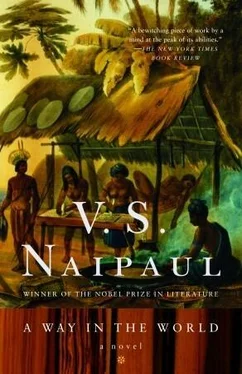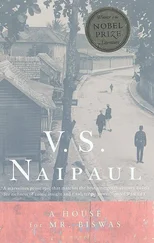“I dressed in my new clothes, with the help of the attendant, and was wondering about going outside when the general and the surgeon came in. They made me understand that I was to sleep in the cabin. A hammock would be set up for me. I was to be the general’s personal servant. The general asked whether I knew about waiting on people, and I told him that I had been in the household of the previous governor of Trinidad and Guiana. I didn’t tell him that the governor was my father.
“My first duty was to serve him his dinner. His cook had died on the voyage out, and he ate what the ship’s galley provided. It was a maize gruel that day. He hardly touched it. Later he and the surgeon walked, and he played with the tortoise. In the cabin in the evening we didn’t talk. He didn’t want to be alone. He wanted my company, but he wanted me to stay a stranger. At some time in the night he got out of his cotton hammock. He wanted to eat something. He ate a stewed prune, from a barrel he had brought out from England. I didn’t like the way the prune or the barrel looked, after he had taken out the cover, and I thought the smell very unpleasant. He said it was the only thing he could eat easily, after his sickness on the voyage, and he had very few left. He said the last few apples he had brought out from England had been stolen by the men. He looked very thin in his shirt. It was pitiful to see him.
“He was old and sick and thin, but he could be very rough with people, especially with people who served him. He wanted them to know that he didn’t think much of them; he could be a shouter. For some reason he wasn’t like that with me, and this gave me some standing among the English on the ship. I have to say that I had never in my life been shown anything like that regard, not in New Granada, not in San Thomé when I was with the Berrios. At the same time I saw that this good fortune of mine wasn’t going to last, that the position of the general here in the Gulf was almost like the position of his commander on the river.
“He was a doomed man. Everyone knew it. The surgeon, the mariners, the soldiers, the men who cooked his meals in the galley. He had lost many men, many friends, many noblemen. He had lost his son. And he had Spanish blood on his hands. He shouldn’t have allowed that to happen. He had promised the English king there would be no fighting with the Spaniards. That battle at San Thomé shouldn’t have taken place. I understood about that later. What I understood at the time was that he had not found gold, and that as soon as he went back to England he would be arrested by orders of the English king, and after that he would be executed.
“That was his future, yet in the meantime he was the general. He had ships and men at his disposal. He could order men to do what he wanted. He could shout at the mariners and the serving people. And of course it was still possible that if he found gold everything would be reversed. He would live and be honoured. If he could find the gold that he had made people believe only he knew how to find. But the gold didn’t exist. To the people of San Thomé it was a joke when we heard that the English were coming to seize our gold mines.
“I don’t think anyone on the Destiny or the other ships believed in the gold either. And yet they were all there in the Gulf, under the orders of the general whose life was more or less over. They were waiting, doing nothing. Like the general. Some of them found it hard. A few days after I arrived, a couple of the general’s ships slipped away, heading north up the Gulf to the Dragon’s Mouth and the Caribbean Sea. The general appeared not to notice.
“The surgeon came to the cabin three or four times a day. The general talked a lot to him. In fact, he was the only one the general talked to. He talked about attacking Trinidad and holding Port of Spain to ransom. He had done it twenty-three years before, he said, and he could do it again. This time he would ask the Spaniards for twenty thousand pounds, and he would burn the city, a street a day, until the Spaniards paid. He talked about attacking Cumaná and Puerto Cabello, and then establishing a base in Florida.
“At first I took what he said seriously, and then I saw that he stood no chance at all, had nowhere in the world to hide, that whatever luck he might have the first time or the second time in those ventures he was outlining, the ships from England would come after him again and again. The way the Spanish ships had come again and again to our part of the world. Then I understood that he was talking just to impress the surgeon and even a little to impress me. He would tell me in Spanish what he had been telling the surgeon, and then he would say, almost as though it was a joke, ‘What do you think, Don José?’
“When the surgeon left and we were alone in the cabin, the old man would go silent. In daylight and in darkness I could feel him grieving for his son and thinking of his own death. Once or twice he took out a book and sat down to write in it. But he didn’t write anything. They told me later it was the journal he had kept since he had left England with his ships and men. Even when he had been very ill he had written in that book. But he had written nothing in it since the launch had come from San Thomé with the news.
“He was waiting for his commander from San Thomé. It was really all we were doing there in the Gulf, waiting for that defeated man with the bad eye. He talked about it many times a day, as though it was the one thing that was still clear to him.
“At last one day, about thirteen or fourteen days after I had arrived, the commander’s ship appeared in the south, coming up the channel to our left. The sentinel ship signalled, the mariners and soldiers shouted the news, and people ran to the deck to wait. Not the general, though. I had been helping him to get ready to go out for a walk on deck, but when he heard the news he said he didn’t think he was well enough. He wasn’t making it up. His face changed. It seemed to shrink. It became older, full of creases. He said he would stay in his cabin. But he wanted me to go out and see what was happening.
“I went outside. It was just before noon, and the decks felt hot below the soles of my new shoes. The sky was full of big moving clouds, and the choppy sea was all glitter. The ship came up slowly, the light from sea and sky dancing about it, the shape and colours of its masts and sails coming and going. The birds from The Soldier floated high above. When the ship came nearer I saw that it was flying two white flags. I don’t know what that meant.
“The ship anchored a little distance away. A boat was lowered. Rowers climbed down the rope ladder into the boat. The commander appeared on the deck of his ship, tall, dressed in the same clothes I had last seen him in, holding his polished stick of office. With that stick always in his right hand, he climbed down the ladder. He was rowed over to us. He was still the commander of the river force at that moment, but as soon as he held on to the ship’s ladder and began to come up to the deck that authority left him. And I thought how strange it was, that just a few weeks ago the English pikemen at San Thomé were within two or three minutes of hanging me. The Negroes saved me then, and after that for many weeks my life depended on this man. Now I was on the general’s ship, and with everyone else was studying every movement of this condemned man coming up the ladder with his now useless commander’s stick.
“He had grown very thin. We didn’t have much to eat on the ship. He would have had less on the river. His clothes were dirty. So were his hands. They were discoloured with old dirt, and full of scratches, some fresh, some healing. I suppose a campaigning soldier’s hands are very rough, but I had never thought about it until that moment. One eye was very quiet, almost dead; the other eye, the bad one, was jumping about madly. He didn’t look at me. There was nothing in his face to show that he even recognized me as the man he had dressed in the Spanish governor’s clothes and sent as a prisoner to the general.
Читать дальше












